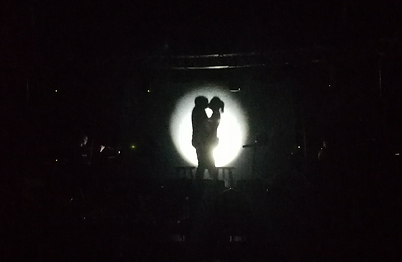DU-O (2019)
for two kissers, two instrumentalists and one spotlight - 7 minutes
As I was walking down the Große Petersgrube in Lübeck in 2018, I crossed a young couple making out on the street. Although I have nothing against public displays of affection in general, I was triggered by the sound of their lips touching. It was something I have had before: the sound of other people kissing somehow triggered a form of misophonia for me. I reflected on how it is possible that these affectionate sounds could evoke such unpleasant feelings and if it would help me come clean with them if I explored them more. So, I decided to compose a work "based on the sound of a kiss".

First, I sonically explored different types of kisses and created a sound database that I wanted to work with. Next, I drew on data from user interactions on the digital dating platform Tinder as a base for building a serialist framework. I constructed mathematical rows based on my swiping preferences and the public data of the people I matched with (such as age, distance, and their pictures). This process resulted in six variations of one serialist row.

The variations were then meticulously notated, including instructions on sound, duration, loudness, and additional gestures. The performers are not only creating sounds; they are also performing a short shadow play on stage. Hidden behind a semi-transparent tarp and supported by a spotlight, they depict a small love story with its initial insecurities, passion, and final challenges.
The composition’s mathematical nature combined with the spontaneity and intimacy of the act of kissing serves as a musical reflection on the paradox of human dating through electronic devices.
DU-O premiered at the ljudOljud festival in Stockholm (SE) in spring 2019. A second performance happened at Labo Scènes ActuelleS in Lyon (FR) in autumn 2019. Many thanks to Olga and Stan, Mélanie and Robert, and Vladimir and Mélisande for kissing; to Sara Constant, Hanna Anderberg, and Colin Heller for playing; to Helena Tulve, Marie Samuelsson, and Alexander Schubert for their compositional wisdom; and to the whole CoPeCo class for helping out with the stage set-up and the support!

